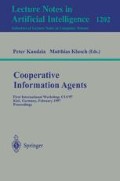Abstract
We propose an agent architecture that provides transparent access to a set of distributed, heterogeneous, and autonomous information sources. Our objectives are twofold: First, we want to support quick development of mediators by automatically deriving mediator specifications which are subsequently fed to a mediator generator. Second, we wish to supply the user with a relatively simple model of the information provided in the system so that he can formulate queries without being aware of the existing information sources or service providers and their locations. The system then uses its knowledge about available information sources to generate appropriate query execution plans.
Supported in part by a DFG postgraduate fellowship (Graduiertenkolleg) at Fakultät für Informatik, University of Karlsruhe
Preview
Unable to display preview. Download preview PDF.
References
C. Batini, M. Lenzerini, and S. B. Navathe. A comparative analysis of methodologies for database schema integration. ACM Computing Surveys, 18(4):323–364, 1986.
M. W. Bright, A. R. Hurson, and S. H. Pakzad. A Taxonomy and Current Issues in Multidatabase Systems. IEEE Computer, 25(3):50–60, 1992.
C. A. Galindo-Legaria. Outerjoins as Disjunctions. In Proc. of ACM SIGMOD, pages 348–358, Minneapolis, Minnesota, USA, 1994.
H. Jamil and P. Johannesson. Semantic interoperability — context, issues and research directions. In Proc. of the 2. CoopIS, pages 180–191, Toronto, Canada, 1994.
M. Jarke, S. Eherer, R. Gallersdörfer, M. A. Jeusfeld, and M. Staudt. Concept-base — a deductive object base for meta data management. Journal on Intelligent Information Systems, 4(2):167–192, 1995.
W. Kim. Modern Database Systems. Addison-Wesley, 1995.
F. Leymann. A Survey of the Universal Relation Model. Data&Knowledge Engineering, 4:305–320, 1989.
W. Li and C. Clifton. Semantic integration in heterogeneous databases using neural networks. In Proc. of the 20th VLDB, Santiago, Chile, pages 1–12, 1994.
L. Liu, C. Pu, and Y. Lee. An Adaptive Approach to Query Mediation across Heterogeneous Information Sources. In Proc. of the 1. IFCIS CoopIS, pages 144–156, Brussels, Belgium, 1996.
D. Maier, D. Rozenshtein, and D. Warren. Window functions. In P. Kanellakis and F. Preparata, editors, Advances in Computing Research 3: The Theory of Databases, pages 213–246. JAI Press, 1986.
D. Maier, J. D. Ullman, and M. Y. Vardi. On the Foundations of the Universal Relation Model. ACM TODS, 9(2):283–308, 1984.
Object Management Group, Inc. (OMG). The Common Object Request Broker: Architecture and Specification, Version 2.0, July 1995.
Y. Papakonstantinou, H. Garcia-Molina, and J. Ullman. MedMaker: A Mediation System Based on Declarative Specifications. In Proc. Intl. Conf. on Data Engineering, pages 132–141, New Orleans, USA, 1996.
A. Rajaraman, Y. Sagiv, and J. D. Ullman. Answering Queries Using Templates with Binding Patterns (Extended Abtract). In Proc. 14th ACM PODS, pages 105–112, San Jose, California, 1995.
A. Rajaraman and J. D. Ullman. Integrating Informations by Outerjoins and Full Disjunctions. In Proc. 15th ACM PODS, pages 238–248, Montreal, Canada, 1996.
C. Reck and G. Hillebrand. Implementing a Universal Relation Interface Using Access Scripts with Binding Patterns. Technical Report 1996-40, Universität Karlsruhe, November 1996. Available via ftp://ftp.ira.uka.de/pub/unikarlsruhe/papers/Techreports/1996/1996-40.ps.gz, submitted for publication.
A. Rosenthal and E. Sciore. Description, conversion, and planning for semantic interoperability. In Proc. of DS-6. IFIP, 1996.
W. W. Song, P. Johannesson, and J. A. Bubenko Jr. Semantic similarity relations in schema integration. In Proc. of ER-92. Springer, 1992.
J. D. Ullman. Principles of Database and Knowledge-Base Systems, volume 2. Computer Science Press, 1989.
M. Y. Vardi. The Universal-Relation Data Model for Logical Independence. IEEE Software, pages 80–85, march 1988.
G. Wiederhold. Mediation in the architecture of future information systems. IEEE Computer, 25(3):38–48, 1992.
G. Wiederhold. Intelligent Integration of Information. Kluwer, 1996.
G. Zhou, R. Hull, and R. King. Generating data integration mediators that use materialization. Journal of Intelligent Information Systems, 6(2/3):111–134, 1996.
Author information
Authors and Affiliations
Editor information
Rights and permissions
Copyright information
© 1997 Springer-Verlag Berlin Heidelberg
About this paper
Cite this paper
Reck, C., König-Ries, B. (1997). An architecture for transparent access to semantically heterogeneous information sources. In: Kandzia, P., Klusch, M. (eds) Cooperative Information Agents. CIA 1997. Lecture Notes in Computer Science, vol 1202. Springer, Berlin, Heidelberg. https://doi.org/10.1007/3-540-62591-7_39
Download citation
DOI: https://doi.org/10.1007/3-540-62591-7_39
Published:
Publisher Name: Springer, Berlin, Heidelberg
Print ISBN: 978-3-540-62591-9
Online ISBN: 978-3-540-68321-6
eBook Packages: Springer Book Archive

